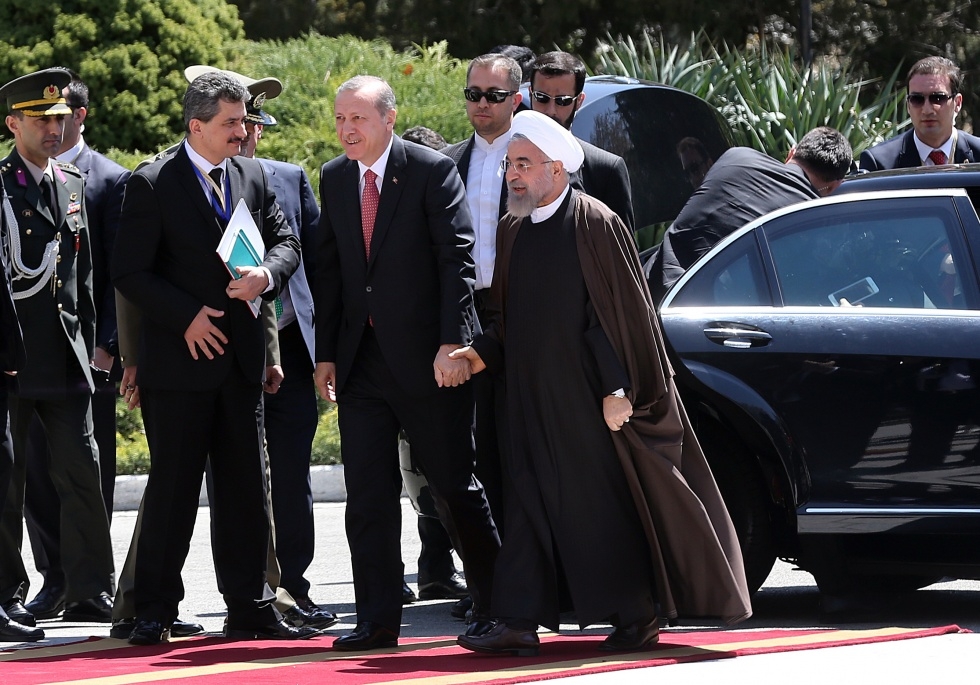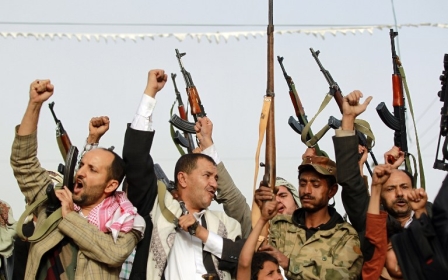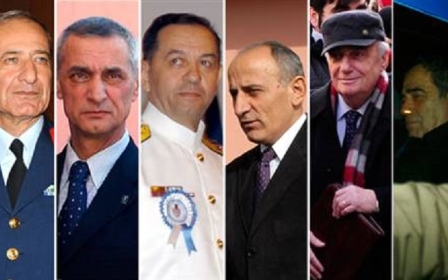Rouhani and Erdogan agree Yemen bloodshed must stop 'immediately': Iran

Turkey and Iran have agreed on the need for a political solution to end Yemen's war, which has raised tensions between them, Iran's president said on Tuesday after talks with his visiting Turkish counterpart.
"We talked about Iraq, Syria, Palestine... We had a long discussion about Yemen," Iran's President Hassan Rouhani said during a joint press conference broadcast by state television, adding: "We both think war and bloodshed must stop in this area immediately and a complete ceasefire must be established and the strikes must stop."
Turkey's President Recep Tayyip Erdogan made no remarks about Yemen, but he talked at length about bilateral relations with Iran.
Iran, which has publicly said that it supports Yemen’s Houthis, has condemned airstrikes against the group by an Arab coalition led by Saudi Arabia.
Turkey supports the Saudi-led campaign, known as Decisive Storm, and the issue has caused friction between Ankara and Tehran.
Rouhani on Tuesday said he hoped that Iran and Turkey, "with the help of other countries in the region", could contribute to "peace, stability, a broader government and dialogue" between Yemenis.
"We agree on the fact that instability, insecurity and war must cease throughout the region," he said.
Erdogan denounced at the end of March what he called Iran's will for "domination" in Yemen, calling on Tehran to "withdraw all its forces from Yemen, Syria and Iraq".
Iranian Foreign Minister Mohammed Javad Zarif reacted by accusing Ankara of fuelling instability in the Middle East.
Iranian newspapers and conservatives for their part denounced Erdogan's "insult" and called for his visit to be cancelled.
However, the one-day visit went ahead, with Erdogan also meeting Iran's supreme leader, Ayatollah Ali Khamenei, during his trip.
Zarif is due to travel to Oman on Wednesday and then Pakistan for talks on the Yemen conflict, according to Iran’s state IRNA news agency.
Tensions and trade
Turkey and Iran are also opposed on Syria, with Tehran the main regional ally of President Bashar al-Assad and Ankara supporting the uprising against him.
Erdogan on Tuesday called for Turkey and Iran to “play the role of mediators” in Syria.
He also warned that “history and culture has been slaughtered in Iraq”.
Despite the tensions, the neighbouring countries want to strengthen trade to equal $30bn, from a current $15bn annually.
Erdogan pointed out that the balance of trade was unfavourable to Turkey, since "Iran exports $10bn and imports only $4bn in Turkish products."
He asked for a reduction in the price of gas purchased from Iran – Turkey is a key importer of Iranian natural gas, with 11 billion cubic metres shifted along the Tabriz-Ankara pipeline annually.
"The gas we buy from Iran is the most expensive. If the price drops we can buy more," Erdogan said. "That's what a friendly country is."
During the visit, eight documents, particularly in the areas of transport, customs, industry and health were signed.
As a result of the agreements, Turkish truckers will now travel through Iran rather than Egypt en route to the Gulf States.
“A new trans-Iran route is expected to halve the costs,” a Turkish logistics magnate said on Tuesday.
New MEE newsletter: Jerusalem Dispatch
Sign up to get the latest insights and analysis on Israel-Palestine, alongside Turkey Unpacked and other MEE newsletters
Middle East Eye delivers independent and unrivalled coverage and analysis of the Middle East, North Africa and beyond. To learn more about republishing this content and the associated fees, please fill out this form. More about MEE can be found here.




